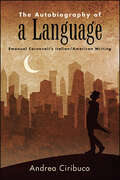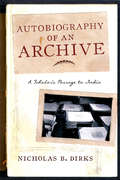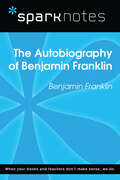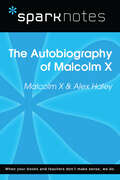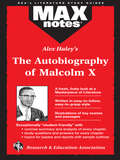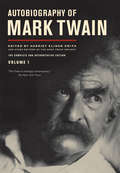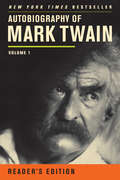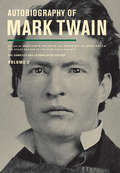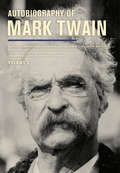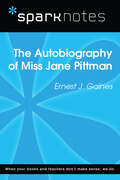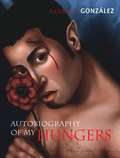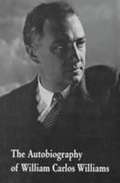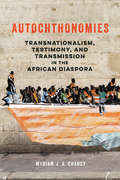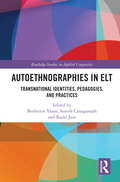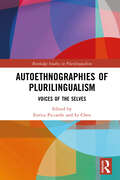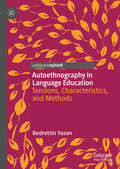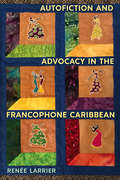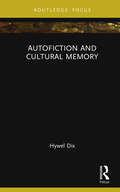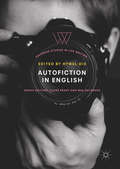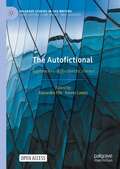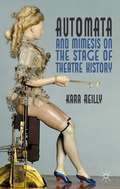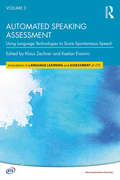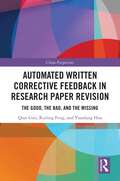- Table View
- List View
The Autobiography of a Language: Emanuel Carnevali's Italian/American Writing (SUNY series in Italian/American Culture)
by Andrea CiribucoThe Autobiography of a Language is an exploration of the deep and powerful ties between language and identity, focusing on an Italian American author and addressing global themes of modern writing. This is the first extensive, book-length work on Emanuel Carnevali (1897–1942), the first Italian American to attain literary recognition. It is a study on how an Italian immigrant to New York became an author and a key figure in transnational modernism. Most importantly, though, it's a study of contacts between American and Italian literatures in the modernist era, and an exploration of the challenges of writing in a second language. Carnevali's works are almost exclusively in English, even though he spent only eight years in the United States before returning to Italy. Combining literary analysis with some of the latest findings in applied linguistics and the study of bilingualism, this book contributes to a very active debate in the fields of comparative literature and translation studies: the implications of translingual writing. Andrea Ciribuco considers both the linguistic and cultural aspects of writing in a second language, examining its potential and pitfalls, and bringing Carnevali's works in touch with the sociocultural context of the great wave of Italian emigration.
Autobiography of an Archive: A Scholar's Passage to India (Cultures of History)
by Nicholas DirksThe decades between 1970 and the end of the twentieth century saw the disciplines of history and anthropology draw closer together, with historians paying more attention to social and cultural factors and the significance of everyday experience in the study of the past. The people, rather than elite actors, became the focus of their inquiry, and anthropological insights into agriculture, kinship, ritual, and folk customs enabled historians to develop richer and more representative narratives. The intersection of these two disciplines also helped scholars reframe the legacies of empire and the roots of colonial knowledge. <P><P>In this collection of essays and lectures, history's turn from high politics and formal intellectual history toward ordinary lives and cultural rhythms is vividly reflected in a scholar's intellectual journey to India. Nicholas B. Dirks recounts his early study of kingship in India, the rise of the caste system, the emergence of English imperial interest in controlling markets and India's political regimes, and the development of a crisis in sovereignty that led to an extraordinary nationalist struggle. He shares his personal encounters with archives that provided the sources and boundaries for research on these subjects, ultimately revealing the limits of colonial knowledge and single disciplinary perspectives. Drawing parallels to the way American universities balance the liberal arts and specialized research today, Dirks, who has occupied senior administrative positions and now leads the University of California at Berkeley, encourages scholars to continue to apply multiple approaches to their research and build a more global and ethical archive.
The Autobiography of Benjamin Franklin (SparkNotes Literature Guide Series)
by SparkNotesThe Autobiography of Benjamin Franklin (SparkNotes Literature Guide) by Benjamin Franklin Making the reading experience fun! Created by Harvard students for students everywhere, SparkNotes is a new breed of study guide: smarter, better, faster.Geared to what today's students need to know, SparkNotes provides:chapter-by-chapter analysis explanations of key themes, motifs, and symbols a review quiz and essay topicsLively and accessible, these guides are perfect for late-night studying and writing papers.
Autobiography of Malcolm X (SparkNotes Literature Guide Series)
by SparkNotesAutobiography of Malcolm X (SparkNotes Literature Guide) by Malcolm X and Alex Haley Making the reading experience fun! Created by Harvard students for students everywhere, SparkNotes is a new breed of study guide: smarter, better, faster.Geared to what today's students need to know, SparkNotes provides:chapter-by-chapter analysis explanations of key themes, motifs, and symbols a review quiz and essay topicsLively and accessible, these guides are perfect for late-night studying and writing papers.
The Autobiography of Malcolm X as told to Alex Haley (Maxnotes Literature Guides)
by Anita AboulafiaREA's MAXnotes for Alex Haley's The Autobiography of Malcolm X MAXnotes offer a fresh look at masterpieces of literature, presented in a lively and interesting fashion. Written by literary experts who currently teach the subject, MAXnotes will enhance your understanding and enjoyment of the work. MAXnotes are designed to stimulate independent thought about the literary work by raising various issues and thought-provoking ideas and questions. MAXnotes cover the essentials of what one should know about each work, including an overall summary, character lists, an explanation and discussion of the plot, the work's historical context, illustrations to convey the mood of the work, and a biography of the author. Each chapter is individually summarized and analyzed, and has study questions and answers.
Autobiography of Mark Twain: The Complete and Authoritative Edition, Vol. 1
by Benjamin Griffin Harriet E. Smith Victor Fischer Michael B. Frank Mark Twain"I've struck it!" Mark Twain wrote in a 1904 letter to a friend. "And I will give it away--to you. You will never know how much enjoyment you have lost until you get to dictating your autobiography." Thus, after dozens of false starts and hundreds of pages, Twain embarked on his "Final (and Right) Plan" for telling the story of his life. His innovative notion--to "talk only about the thing which interests you for the moment"--meant that his thoughts could range freely. The strict instruction that these texts remain unpublished for 100 years meant that when they came out, he would be "dead, and unaware, and indifferent," and that he was therefore free to speak his "whole frank mind." The year 2010 marks the 100th anniversary of Twain's death. In celebration of this important milestone and in honor of the cherished tradition of publishing Mark Twain's works, UC Press is proud to offer for the first time Mark Twain's uncensored autobiography in its entirety and exactly as he left it. This major literary event brings to readers, admirers, and scholars the first of three essential volumes and presents Mark Twain's authentic and unsuppressed voice, brimming with humor, ideas, and opinions, and speaking clearly from the grave as he intended.
Autobiography of Mark Twain: Volume 1, Reader's Edition
by Harriet E. Smith Mark TwainThe year 2010 marked the 100th anniversary of Mark Twain's death. In celebration of this important milestone and in honor of the cherished tradition of publishing Mark Twain's works, UC Press published Autobiography of Mark Twain, Volume 1, the first of a projected three-volume edition of the complete, uncensored autobiography. The book became an immediate bestseller and was hailed as the capstone of the life's work of America's favorite author. This Reader's Edition, a portable paperback in larger type, republishes the text of the hardcover Autobiography in a form that is convenient for the general reader, without the editorial explanatory notes. It includes a brief introduction describing the evolution of Mark Twain's ideas about writing his autobiography, as well as a chronology of his life, brief family biographies, and an excerpt from the forthcoming Autobiography of Mark Twain, Volume 2--a controversial but characteristically humorous attack on Christian doctrine.
Autobiography of Mark Twain, Volume 2
by Ms Harriet E. Smith Michael Barry Frank Benjamin Griffin Victor Fischer Mark TwainMark Twain's complete, uncensored Autobiography was an instant bestseller when the first volume was published in 2010, on the centennial of the author's death, as he requested. Published to rave reviews, the Autobiography was hailed as the capstone of Twain's career. It captures his authentic and unsuppressed voice, speaking clearly from the grave and brimming with humor, ideas, and opinions. The eagerly-awaited Volume 2 delves deeper into Mark Twain's life, uncovering the many roles he played in his private and public worlds. Filled with his characteristic blend of humor and ire, the narrative ranges effortlessly across the contemporary scene. He shares his views on writing and speaking, his preoccupation with money, and his contempt for the politics and politicians of his day. Affectionate and scathing by turns, his intractable curiosity and candor are everywhere on view. Editors: Benjamin Griffin and Harriet E. Smith Associate Editors: Victor Fischer, Michael B. Frank, Sharon K. Goetz and Leslie Diane Myrick
Autobiography of Mark Twain, Volume 3
by Ms Harriet E. Smith Benjamin Griffin Mark TwainThe surprising final chapter of a great American life. When the first volume of Mark Twain's uncensored Autobiography was published in 2010, it was hailed as an essential addition to the shelf of his works and a crucial document for our understanding of the great humorist's life and times. This third and final volume crowns and completes his life's work. Like its companion volumes, it chronicles Twain's inner and outer life through a series of daily dictations that go wherever his fancy leads. Created from March 1907 to December 1909, these dictations present Mark Twain at the end of his life: receiving an honorary degree from Oxford University; railing against Theodore Roosevelt; founding numerous clubs; incredulous at an exhibition of the Holy Grail; credulous about the authorship of Shakespeare's plays; relaxing in Bermuda; observing (and investing in) new technologies. The Autobiography's "Closing Words" movingly commemorate his daughter Jean, who died on Christmas Eve 1909. Also included in this volume is the previously unpublished "Ashcroft-Lyon Manuscript," Mark Twain's caustic indictment of his "putrescent pair" of secretaries and the havoc that erupted in his house during their residency. Fitfully published in fragments at intervals throughout the twentieth century, Autobiography of Mark Twain has now been critically reconstructed and made available as it was intended to be read. Fully annotated by the editors of the Mark Twain Project, the complete Autobiography emerges as a landmark publication in American literature. Editors: Benjamin Griffin and Harriet Elinor Smith Associate Editors: Victor Fischer, Michael B. Frank, Amanda Gagel, Sharon K. Goetz, Leslie Diane Myrick, Christopher M. Ohge
The Autobiography of Miss Jane Pittman (SparkNotes Literature Guide Series)
by SparkNotesThe Autobiography of Miss Jane Pittman (SparkNotes Literature Guide) by Ernest J. Gaines Making the reading experience fun! Created by Harvard students for students everywhere, SparkNotes is a new breed of study guide: smarter, better, faster.Geared to what today's students need to know, SparkNotes provides:chapter-by-chapter analysis explanations of key themes, motifs, and symbols a review quiz and essay topicsLively and accessible, these guides are perfect for late-night studying and writing papers.
autobiography of my hungers
by Rigoberto GonzálezRigoberto González, author of the critically acclaimed memoir Butterfly Boy: Memories of a Chicano Mariposa, takes a second piercing look at his past through a startling new lens: hunger. The need for sustenance originating in childhood poverty, the adolescent emotional need for solace and comfort, the adult desire for a larger world, another lover, a different body--all are explored by González in a series of heartbreaking and poetic vignettes. Each vignette is a defining moment of self-awareness, every moment an important step in a lifelong journey toward clarity, knowledge, and the nourishment that comes in various forms--even "the smallest biggest joys" help piece together a complex portrait of a gay man of color who at last defines himself by what he learns, not by what he yearns for.
The Autobiography of William Carlos Williams
by William Carlos WilliamsThis autobiographical account of the life of William Carlos Williams recounts the challenges of being a busy physician in the town of Rutherford, New Jersey as well as pursuing a literary career. One of the finest chapters in this autobiography tells how each of his two roles stimulated and supported the other.
Autochthonomies: Transnationalism, Testimony, and Transmission in the African Diaspora (New Black Studies Series)
by Myriam ChancyIn Autochthonomies, Myriam J. A. Chancy engages readers in an interpretive journey. She lays out a radical new process that invites readers to see creations by artists of African descent as legible within the context of African diasporic historical and cultural debates. By invoking a transnational African/diasporic lens and negotiating it through a lakou or ”yard space,” we can see such identities transfigured, recognized, and exchanged. Chancy demonstrates how the process can examine the salient features of texts and art that underscore African/diasporic sensibilities and render them legible. What emerges is a potential for richer readings of African diasporic works that also ruptures the Manichean binary dynamics that have dominated previous interpretations of the material. The result: an enriching interpretive mode focused on the transnational connections between subjects of African descent as the central pole for reader investigation. A bold challenge to established scholarship, Autochthonomies ranges from Africa to Europe and the Americas to provide powerful new tools for charting the transnational interactions between African cultural producers and sites.
Autoethnographies in ELT: Transnational Identities, Pedagogies, and Practices (Routledge Studies in Applied Linguistics)
by Bedrettin Yazan Rashi Jain Suresh CanagarajahThis innovative volume showcases the possibilities of autoethnography as a means of exploring the complexities of transnational identity construction for learners, teachers, and practitioners in English language teaching (ELT). // The book unpacks the dynamics of today’s landscape of language education which sees practitioners and students with nuanced personal and professional histories inhabit liminal spaces as they traverse national, cultural, linguistic, ideological, and political borders, thereby impacting their identity construction and engagement with pedagogies and practices across different educational domains. The volume draws on solo and collaborative autoethnographies of transnational language practitioners to question such well-established ELT binaries such as ‘center’/’periphery’ and ‘native’/non-native’ and issues of identity-related concepts such as ideologies, discourses, agency, and self-reflexibility. In so doing, the book also underscores the unique affordances of autoethnography as a methodological tool for better understanding transnational identity construction in ELT and bringing to the fore key perspectives in emerging areas of study within applied linguistics. // This dynamic collection will appeal to students, scholars, and practitioners in English language teaching, applied linguistics, TESOL education, educational linguistics, and sociolinguistics.
Autoethnographies of Plurilingualism: Voices of the Selves (Routledge Studies in Plurilingualism)
by Enrica Piccardo Le ChenThis collection spotlights the authentic voices of plurilingual learners, bringing together autoethnographies of over twenty graduate students to deepen current understandings of lived experiences of plurilingualism. The volume begins with outlining foundational work on plurilingualism in language education up to this point, with the body of work on plurilingual subjectivities historically focusing on researchers’ and practitioners’ gazes, rather than students. The book moves into short autoethnographies of graduate students at the University of Toronto enrolled in a graduate education course over three years. Employing autoethnography as the primary methodology allows the space for privileging authentic voices of plurilingual learners in their own words, learners whose individual lived experiences are uniquely contextualized within the lens of plurilingual theory. The volume and diversity of perspectives showcased offer a unique window into the diversity and commonalities among plurilingual learners, offering opportunities for reflection on directions for future research. This book will be of interest to students and scholars in applied linguistics, language teaching and learning, and language education.
Autoethnography in Language Education: Tensions, Characteristics, and Methods
by Bedrettin YazanThis book presents an exploration of autoethnography in language education research as a qualitative method with the potential to decolonize language education practices and include marginalized scholars in knowledge generation. The author situates the method of autoethnography within the field, arguing that it has taken too long for autoethnography to be considered an established research method in language education in particular and in educational research in general. He then addresses tensions at the macro and micro levels of autoethnography, discusses its characteristics, and describes the processes and procedures involved in conducting autoethnographic research. This book will be of interest to graduate students and scholars in language education and related disciplines such as anthropology, communication studies, sociology, and broader educational research.
Autofiction and Advocacy in the Francophone Caribbean
by Renée Larrier"Very refreshing in the understanding of Caribbean literature . . . Succeeds in blending close readings of specific texts with a constant awareness of the larger picture. . . . From a theoretical complexity that calls on Glissant, Fanon, Ngugi, Benito-Rojo among others, this profoundly human exploration of autofiction and advocacy in Francophone Caribbean literature study does not succumb to the temptation of theory; that is, she does not demand texts illustrate a rigid theoretical frame; the reverse is true throughout the study."—Cilas Kemedjio, University of RochesterLarrier breaks new ground in analyzing first-person narratives by five Francophone Caribbean writers—Joseph Zobel, Patrick Chamoiseau, Gisele Pineau, Edwidge Danticat, and Maryse Conde—that manifest distinctive interaction among narrators, protagonists, characters, and readers through a layering of voices, languages, time, sources, and identities. Employing the Martinican combat dance—danmye—as a trope, the author argues that these narratives can be read as testimony to the legacy of slavery, colonialism, and patriarchy that denied Caribbean people their subjectivity. In chapters devoted to Zobel, Chamoiseau, Pineau, Danticat, and Conde—who come from Martinique, Guadeloupe, and Haiti—Larrier probes the presence, construction, and strategy of the first-person narrator, which sometimes shifts within the text itself. Providing a perspective different from European travel literature, these texts deliberately position the "I" as a witness and/or performer who articulates experiences ignored or misinterpreted by sojourners' more widely circulated chronicles. While not purporting to speak for others, the "I" is concerned with transmitting what he or she saw, heard, experienced, or endured, therefore disrupting conventional representations of the Francophone Caribbean. Moreover, in modeling authenticity and agency, autofiction is also a form of advocacy.
Autofiction and Cultural Memory (New Literary Theory)
by Hywel DixAutofiction and Cultural Memory breaks new ground in autofiction research by showing how it gives postcolonial writers a means of bearing witness to past cultural or political struggles, and hence of contributing to new forms of cultural memory. Most discussion of autofiction has treated it as an individualistic form, dealing with the personal growth of its authors. In doing so, it privileges narratives of private development over those of social commitment and accords with Western concepts of ownership and authorship. By contrast, Hywel Dix shows how a variety of writers outside the Western world have used the techniques of autofiction in a different way, placing themselves on the side lines of their own stories to show solidarity with struggles against imperialism and tyranny. Drawing on examples from Algeria, Ethiopia, the Caribbean, the Americas, India and Turkey, Dix presents autofiction as a form which combines the life stories of authors with the collective struggles of their societies to restore to view historical injustices that have been marginalised and forgotten. By contributing to new forms of cultural memory, autofiction raises important questions about what we choose to remember and what we value in the present. This book will be of interest to anyone working in postcolonial studies, world literature, trauma studies, autobiography, life writing or social justice.
Autofiction in English (Palgrave Studies in Life Writing)
by Hywel DixThis innovative volume establishes autofiction as a new and dynamic area of theoretical research in English. Since the term was coined by Serge Doubrovsky, autofiction has become established as a recognizable genre within the French literary pantheon. Yet unlike other areas of French theory, English-language discussion of autofiction has been relatively limited - until now. Starting out by exploring the characteristic features and definitions of autofiction from a conceptual standpoint, the collection identifies a number of cultural, historical and theoretical contexts in which the emergence of autofiction in English can be understood. In the process, it identifies what is new and distinctive about Anglophone forms of autofiction when compared to its French equivalents. These include a preoccupation with the conditions of authorship; writing after trauma; and a heightened degree of authorial self-reflexivity beyond that typically associated with postmodernism. By concluding that there is such a field as autofiction in English, it provides for the first time detailed analysis of the major works in that field and a concise historical overview of its emergence. It thus opens up new avenues in life writing and authorship research.
The Autofictional: Approaches, Affordances, Forms (Palgrave Studies in Life Writing)
by Alexandra Effe Hannie LawlorThis open access book offers innovative and wide-ranging responses to the continuously flourishing literary phenomenon of autofiction. The book shows the insights that are gained in the shift from the genre descriptor to the adjective, and from a broad application of “the autofictional” as a theoretical lens and aesthetic strategy. In three sections on “Approaches,” “Affordances,” and “Forms,” the volume proposes new theoretical approaches for the study of autofiction and the autofictional, offers fresh perspectives on many of the prominent authors in the discussion, draws them into a dialogue with autofictional practice from across the globe, and brings into view texts, forms, and media that have not traditionally been considered for their autofictional dimensions. The book, in sum, expands the parameters of research on autofiction to date to allow new voices and viewpoints to emerge.
Automata and Mimesis on the Stage of Theatre History
by Kara ReillyThe automaton, known today as the robot, can be seen as a metaphor for the historical period in which it is explored. Chapters include examinations of Iconoclasm's fear that art might surpass nature, the Cartesian mind/body divide, automata as objects of courtly desire, the uncanny Olympia, and the revolutionary Robots in post-WWI drama.
Automated Evaluation of Text and Discourse with Coh-Metrix
by Danielle S. McNamara Arthur C. Graesser Philip M. McCarthy Zhiqiang Cai Danielle S. Mcnamara Arthur C. Graesser Philip M. MccarthyCoh-Metrix is among the broadest and most sophisticated automated textual assessment tools available today. Automated Evaluation of Text and Discourse with Coh-Metrix describes this computational tool, as well as the wide range of language and discourse measures it provides. Section I of the book focuses on the theoretical perspectives that led to the development of Coh-Metrix, its measures, and empirical work that has been conducted using this approach. Section II shifts to the practical arena, describing how to use Coh-Metrix and how to analyze, interpret, and describe results. Coh-Metrix opens the door to a new paradigm of research that coordinates studies of language, corpus analysis, computational linguistics, education, and cognitive science. This tool empowers anyone with an interest in text to pursue a wide array of previously unanswerable research questions.
Automated Speaking Assessment: Using Language Technologies to Score Spontaneous Speech
by Klaus Zechner Keelan EvaniniAutomated Speaking Assessment: Using Language Technologies to Score Spontaneous Speech provides a thorough overview of state-of-the-art automated speech scoring technology as it is currently used at Educational Testing Service (ETS). Its main focus is related to the automated scoring of spontaneous speech elicited by TOEFL iBT Speaking section items, but other applications of speech scoring, such as for more predictable spoken responses or responses provided in a dialogic setting, are also discussed. The book begins with an in-depth overview of the nascent field of automated speech scoring—its history, applications, and challenges—followed by a discussion of psychometric considerations for automated speech scoring. The second and third parts discuss the integral main components of an automated speech scoring system as well as the different types of automatically generated measures extracted by the system features related to evaluate the speaking construct of communicative competence as measured defined by the TOEFL iBT Speaking assessment. Finally, the last part of the book touches on more recent developments, such as providing more detailed feedback on test takers’ spoken responses using speech features and scoring of dialogic speech. It concludes with a discussion, summary, and outlook on future developments in this area. Written with minimal technical details for the benefit of non-experts, this book is an ideal resource for graduate students in courses on Language Testing and Assessment as well as teachers and researchers in applied linguistics.
Automated Written Corrective Feedback in Research Paper Revision: The Good, The Bad, and The Missing (China Perspectives)
by Qian Guo Ruiling Feng Yuanfang HuaThis book studies the use of an automated writing evaluation (AWE) systems in research paper revision for publication purposes by Chinese doctoral students.Research writing skills are essential for achieving academic status, and AWE tools can be a great companion on the journey. However, AWE tools may provide a disservice if users do not stay alert to inaccurate feedback, inaccurate correction suggestions, and missed errors. The effects of accurate feedback on revision outcomes have been the focus of a number of AWE studies, but student engagement and revision results in cases of inaccurate feedback and missed errors have rarely been investigated. Such investigations can provide practical advice on using automated feedback in research writing. This book provides a comprehensive evaluation of AWE tools and profiles student engagement with tool use in cases of different qualities of feedback. It can empower novice scholars and improve the effectiveness of academic writing instructors. The findings can also inform AWE system developers about possible ways of system improvement for research paper writing.The book will be particularly useful to students and scholars of language and linguistic studies, education, and academic English writing.
